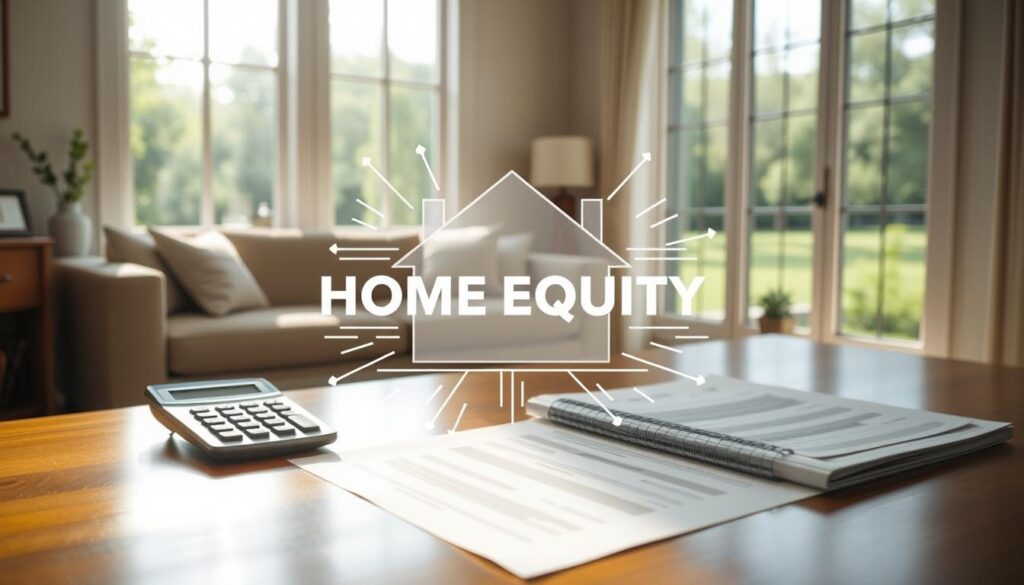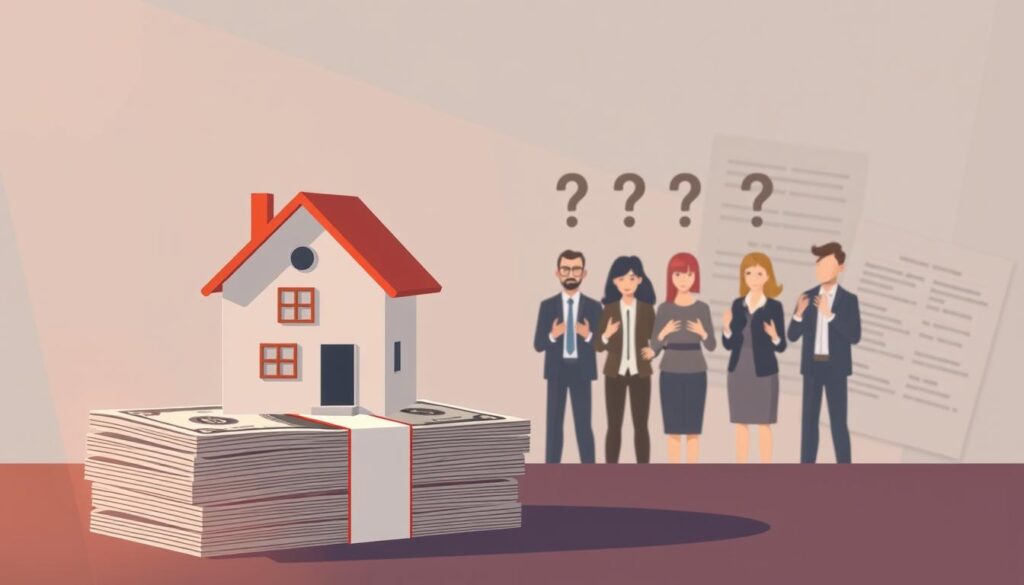Did you know that about 50% of homeowners in the United States have a hidden treasure? They have over $6 trillion in untapped equity. By using a home equity agreement, you can tap into this value. This turns your home into a strong financial tool.
Whether you want to fund home improvements, pay off debt, or reach other financial goals, knowing about home equity agreements is key. It helps you make the most of your home’s potential.
This article will explain everything about home equity agreements. It will show you how to use this financial chance wisely, while also watching out for risks. Let’s explore how home equity can help you!
Understanding Home Equity Agreements
Homeowners looking to use their property’s value should know about home equity agreements. This tool lets you get cash from your home’s equity without selling it. A home equity sharing agreement is a common choice. It gives you a lump sum in exchange for a share of your home’s future growth.
What is a Home Equity Agreement?
A home equity agreement is a contract where you sell part of your home’s equity to investors. You get cash right away, and investors get a return when you sell or the agreement ends. This deal puts a lien on your home to secure the investment. It’s good for those needing funds for renovations, investments, or other financial needs.
How Does It Work?
To start a home equity agreement, you agree on terms with an investor or a financial institution. Then, you get a lump sum of money. You still own your home but must give investors a share of any growth when you sell or the agreement ends. Knowing about home equity can help you make smart financial choices and find better investment opportunities.
The Benefits of Home Equity Agreements
Home equity agreements bring many benefits that can improve your finances. They let you get cash without selling your home. This way, you can use your home’s value without losing it.
They are great for unexpected costs or for investing in new opportunities. This option can change your financial life for the better.
Accessing Cash Without Selling
Home equity lets you get money for different needs without losing your home. It’s a smart way to use your home’s value. You get money right away and still keep your property.
Many people like this because it helps them deal with financial issues. It’s perfect for home improvements, education, or other big expenses. Getting cash easily is a big plus of these agreements.
No Monthly Payments
Home equity agreements also mean no monthly payments. Unlike loans, you don’t have to worry about interest or payments. This makes managing your money easier.
You can plan your finances better without the stress of loan payments. Homeowners can use their funds wisely for long-term goals. This option brings peace of mind and helps you manage your finances better.
Who Can Benefit from a Home Equity Agreement?
Home equity agreements are great for many people. They help homeowners and investors get funds easily. Knowing who can use these agreements can help you use your property’s value well.
Homeowners in Financial Need
Many homeowners face money troubles. A home equity agreement can help. It lets you use your home’s value without monthly payments.
This can ease your financial stress. It gives you the money you need for things like medical bills or fixing your home. It helps you get back on track financially.
Investors Looking to Expand
Investors wanting to grow can use home equity agreements. They can get money for new projects or to improve properties. This way, you can increase your property’s value.
Also, using a home equity agreement to pay off debts can simplify your finances. It lets you focus on growing your investments. This can lead to success in the property market.
| Benefit | Homeowners | Investors |
|---|---|---|
| Access to Cash | Immediate financial relief for urgent needs | Capital for property upgrades or new acquisitions |
| Payment Flexibility | No monthly obligations | Manageable repayment terms to enhance cash flow |
| Investment Opportunities | Support for home improvements to increase property value | Funding for innovative projects or financial strategies |
The Process of Securing a Home Equity Agreement
Getting a home equity agreement involves several important steps. These steps help you use your home’s equity wisely. Knowing these steps can help you understand your options better. This way, you can make the most of your home’s value.
Steps to Apply
- Look for a trusted provider that offers home equity solutions.
- Fill out the application form with details about your property and finances.
- Get an independent appraisal of your home’s value. This is key to figuring out how much equity you have.
- Talk to your provider about the agreement terms before you sign anything.
Required Documentation
When you apply for a home equity agreement, you’ll need certain documents. Having these ready can make the process smoother:
- Proof of income, like pay stubs or tax returns, to show your financial health.
- Documents proving you own the property.
- Recent financial statements to show your overall financial situation.

Comparing Home Equity Agreements with Other Options
Exploring ways to use your home’s equity is key. It’s important to know the differences between home equity loans and agreements. Both let you use your home’s value, but they have their own benefits and drawbacks.
Home Equity Loans vs. Agreements
Home equity loans need regular payments and may have interest costs. Home equity agreements, on the other hand, let you get funding without having to pay it back right away. This makes agreements more flexible, which is great for those in tough financial spots.
By looking at both, you can pick the one that fits your financial goals best.
Traditional Refinancing Alternatives
Traditional refinancing can help you combine your debts. But, it can also mean paying interest over time. Unlike loans or agreements, refinancing usually means making monthly payments. This might not work for everyone’s budget.
Knowing these differences helps you use your home’s equity wisely. With this info, you can make smart choices to reach your financial goals.
Potential Risks of Home Equity Agreements
Thinking about a home equity investment? It’s key to know the risks of home equity agreements. These deals can help financially, but they have rules you must understand.
Understanding the Terms
Your agreement might have clauses that put a lien on your property. This lien could stop you from making changes to your home or selling it freely. Knowing these terms is vital for anyone looking into home equity agreements.
Market Fluctuations
Real estate markets can change quickly. If home values go up fast, you might owe more than you got initially. Keeping an eye on market changes helps you see how your debt could grow. This awareness is important for understanding the risks of home equity agreements.
| Aspect | Details |
|---|---|
| Understanding Home Equity Agreements | Essential to review terms including any liens on property. |
| Market Fluctuations | Home values may rise, affecting your repayment amounts. |
| Control over Property | Liens can restrict your ability to sell or alter your home. |
| Long-Term Financial Impact | Potential escalations in what you owe can affect future financial planning. |
Finding the Right Home Equity Agreement Provider
Choosing the right home equity agreement provider is key to getting the most from your home’s value. There are many options out there. Look for providers that offer good terms, no hidden fees, and high customer satisfaction.
Key Factors to Consider
- Terms Offered: Make sure the terms are clear and meet your financial needs.
- Fees: Know all the fees upfront. Hidden costs can reduce the benefits of using your home’s equity.
- Customer Service: Check if they offer good customer support before and after the agreement.
- Reputation: Read reviews to see how past clients feel about the provider.
Questions to Ask
Before you decide, ask these questions to the providers:
- What costs can I expect during the agreement term?
- Can you explain the repayment terms in detail?
- Is it possible to change the terms if my financial situation changes?
- What kind of support do you offer for those looking to use their home’s equity?
Success Stories: Homeowners Who Benefited
Many homeowners have seen big changes thanks to home equity agreements. These stories show how using home equity can change your finances and boost your property’s value. By tapping into your home’s equity, you can make big improvements in your life.
Case Study 1: Home Renovations
The Rodriguez family got $50,000 from an equity agreement. They used $30,000 for a kitchen makeover. This upgrade not only made their home better but also increased its value by $26,400. This is a 94% return, showing how smart home equity use can be.
Case Study 2: Debt Consolidation
A homeowner paid off $28,000 in hospital bills with equity funds. This move eased their financial stress and helped their cash flow. These stories prove the power of home equity agreements in real life.
| Homeowner Action | Funding Accessed | Investment | Property Value Increase | Net Position |
|---|---|---|---|---|
| Kitchen Remodel | $50,000 | $30,000 | $26,400 | $20,000 cash and +$26,400 equity |
| Debt Consolidation | $28,000 | N/A | N/A | Improved cash flow |
These stories show how homeowners are making the most of their homes with equity agreements. For more information, check out this resource.
Making the Most of Your Home Equity Agreement
After getting a home equity agreement, it’s key to make a good financial plan. This plan should help you use the money wisely. You might want to pay off debt, fix up your home, or explore new chances.
Setting clear goals is important. It helps you decide how to use the money you got. Planning well can really change your financial future for the better.
Tips for Future Financial Planning
First, look at your current money situation. Think about how the home equity money can help you. Make a budget that shows what you’ll spend and what you might earn.
Matching your home equity plan with your financial goals is smart. This way, you can make the most of your home. And you’ll make sure you’re spending money that helps you grow your wealth over time.
Using Funds Wisely
When using your home equity money, choose carefully. Use some to pay off debts with high interest rates. This can help your credit score and reduce stress.
If you’re thinking about improving your home, pick projects that increase its value. A smart plan for using the money can boost your financial health for years to come.



